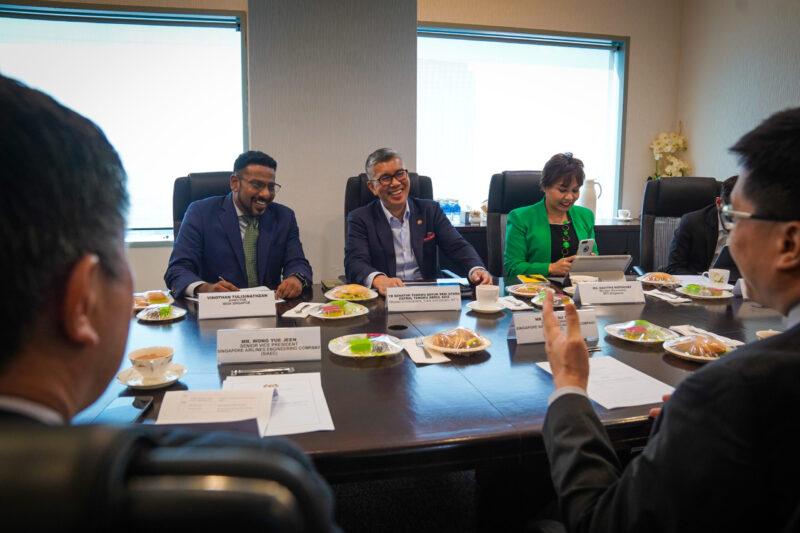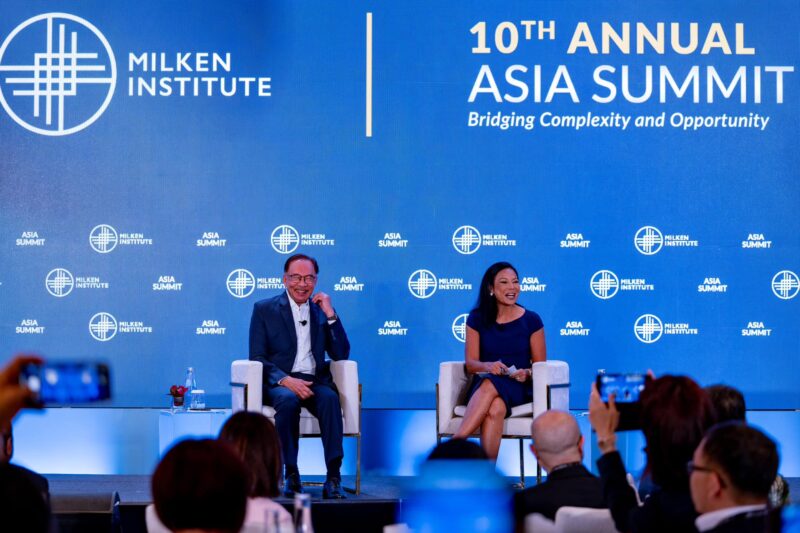
This site
is mobile
responsive

On September 13, 2023, the Malaysian Prime Minister, YAB Dato’ Seri Anwar bin Ibrahim embarked on a short working visit to the Republic of Singapore in conjunction with the 10th Asia Summit organised by the renowned Milken Institute covering economics, finance, healthcare, public policy, and philanthropy./p>
Accompanying the Prime Minister were YB Dato’ Seri Diraja Dr. Zambry Abdul Kadir, the Minister of Foreign Affairs and YB Senator Tengku Datuk Seri Utama Zafrul Aziz, the Minister of Investment, Trade and Industry (MITI). The Prime Minister assumed a significant role during the summit as a keynote speaker in two special sessions.
The Milken Institute Asia Summit, an annual gathering of academicians, policymakers and industry leaders, focused on critical issues such as sustainability, equality, digitisation and innovation.
The first session, titled ‘A Conversation with the Prime Minister of Malaysia’ was hosted by Ms. Haslinda Amin, the Chief International Correspondent for Southeast Asia at Bloomberg. In this session, the Prime Minister took the stage to unravel the MADANI Economy Framework, a plan grounded in transparent economic principles and good governance. Its aims were ambitious to enhance Malaysia’s competitiveness, attract investment, promote social justice and equality, and rebuild trust in the government. The Prime Minister underlined the framework’s key elements, stressing the value of Malaysia’s talent pool, its strategic geographical location, and its robust industrial base. He painted a picture of Malaysia’s aspirations aiming to secure a spot among the world’s top 30 largest economies by 2030. Collaboration among the people, government, and industry players was emphasised as crucial for the success of this framework.
Political stability was also stressed as a foundation for Malaysia’s prosperity and its ability to attract high-quality international investment. He noted the significance of Mega Free Trade Agreements (FTA) like the Regional Comprehensive Economic Partnership (RCEP) and the Comprehensive and Progressive Agreement for Trans-Pacific Partnership (CPTPP) in positioning ASEAN as an attractive destination for foreign direct investments (FDIs).
The world recognised Malaysia’s progress in the 2023 IMD World Competitiveness Ranking (WCR) from 32nd to 27th, a testament to investors’ trust. The Milken Institute acknowledged Malaysia as a top FDI destination among emerging Southeast Asian nations.
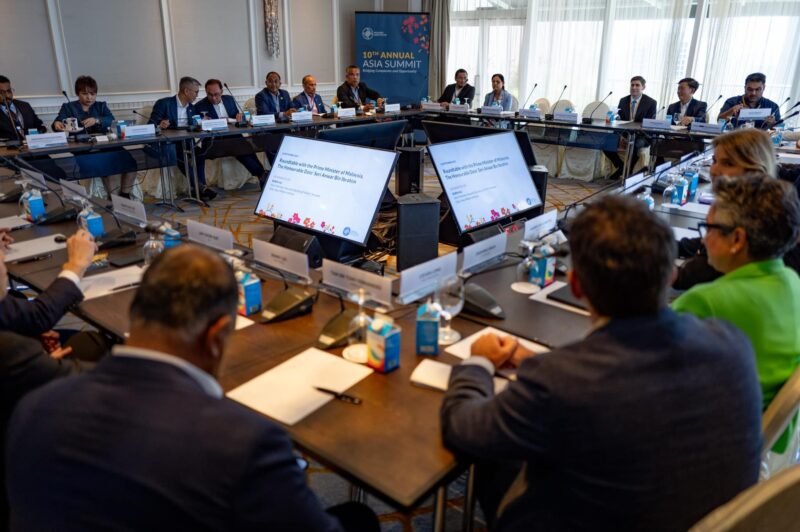
The Prime Minister discourse extended to Malaysia’s efforts to transform its large-scale industries, particularly through the New Industrial Master Plan 2030 (NIMP 2030), requiring a significant investment of RM95 billion over seven (7) years. Sustainability was a focal point and the National Energy Transition Roadmap (NETR) was a pivotal role in Malaysia’s commitment to environmental responsibility.
The digital economy was identified as a rapidly growing sector, with substantial investments seen in Q3 of 2022. The Prime Minister shared that the digital economy was poised to contribute 22.6% of Malaysia’s GDP by 2025. Initiatives like the National Business Digital Adoption Index (BDAI) and the preparations for 5G adoption were also on the agenda. An MOU signed between Malaysia and Singapore to integrate “Paynow” and “Duit Now” was designed to facilitate cross-border payments.
Beyond the formalities of the summit, a private roundtable meeting was organised between the Prime Minister and global investors, putting the spotlight on Malaysia’s investment outlook and policies, including the MADANI Economy Framework, NIMP 2030 and NETR and the Mid-Term Review of the Twelfth Malaysia Plan (12MP). He underscored the MADANI Economy Framework’s significance as the foundation of Malaysia’s economic narrative and its role in boosting investor trust.
In addition, YB Senator Tengku Datuk Seri Utama Zafrul Abdul Aziz, Minister of Investment, Trade and Industry (MITI) was also one of the key speakers during the second day of the Milken Summit. In a session titled ‘Global Overview: Illuminating Pathways Through Complexities’, The MITI Minister delved into the challenges and opportunities presented by the post-pandemic global landscape. He also emphasised the critical need for agility and adaptability, particularly for emerging markets like Malaysia. The MITI Minister underscored the imperative for reforms aimed at revitalising Malaysia’s investment performance, giving special attention to the manufacturing sector. Under the framework of NIMP 2030, the focus has shifted from a traditional sector-based approach to a mission-based one, ensuring that Malaysian industries can effectively navigate new global megatrends while building resilience.
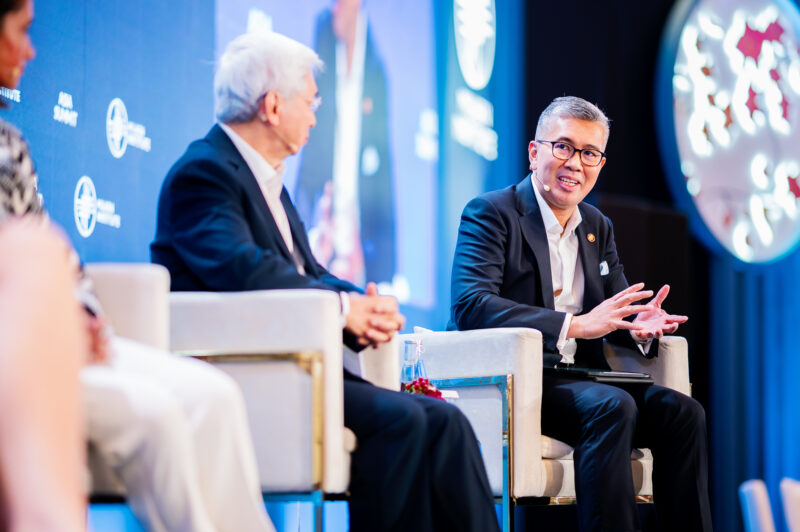
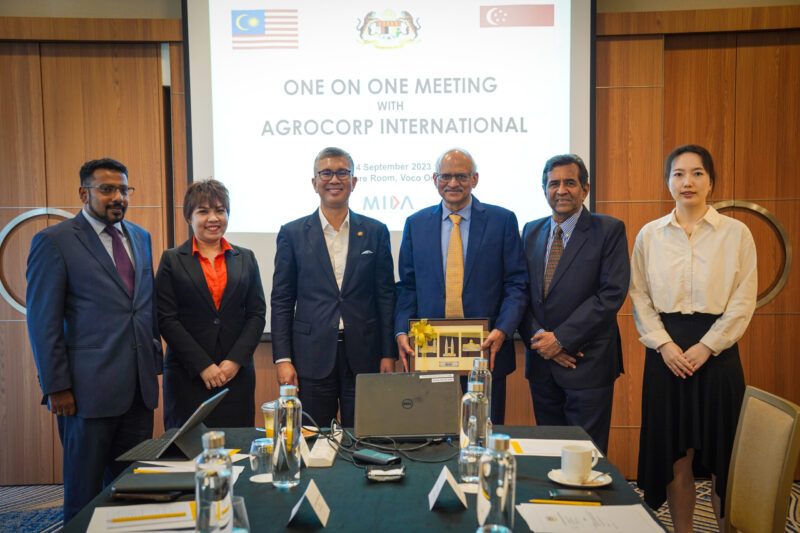
The momentum continued as one-to-one meetings were organised by MIDA revealed promising investment plans from Singapore-based companies. INV New Material Technology, a subsidiary of Senior International (Singapore) and Shenzhen Senior Technology Material, is set to establish and build a state-of-the-art manufacturing facility for electric vehicle (EV) separators. Agrocorp, with advanced technology and research and development (R&D) capabilities, aims to collaborate on plant-based protein supply chain development.
SIAEC and Maersk expressed strong interest in expanding their projects, positioning Malaysia as an aerospace and regional logistic hub. These projects were not just about business, they promised to create numerous job opportunities and contribute significantly to the country’s economic growth.
The visit underscores the growing economic ties between Malaysia and Singapore, with bilateral trade on the rise. Singapore remained a crucial source of foreign investment for Malaysia, and both nations were keen to harness their strengths for mutual growth in sectors like electrical and electronics, medical technology, alternative protein, green technology, and the digital economy. With the presence of Singapore-based companies, this partnership was set to further strengthen Malaysia’s industry ecosystem.
